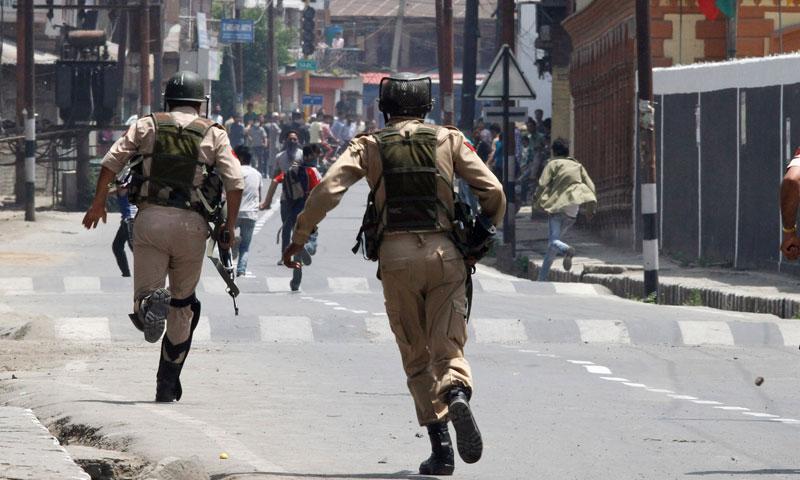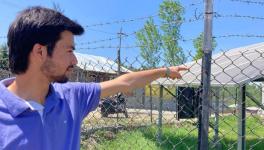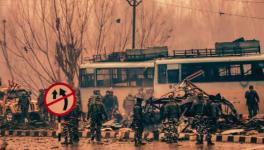AFSPA and Peace in Kashmir
Lt. Gen. (Retd.) Syed Ata Hasnain, Ex-GOC of 15 Corps, Jammu and Kashmir, talks to Newsclick India and The Citizen on the Armed Forces Special Powers Act (AFSPA) in Kashmir. He says the AFSPA was brought in for a particular purpose, which was to assist in finding peace in Kashmir. He argues that if today in 2014, we find that we have actually established peace in the manner we sought it, then there is no reason why AFSPA should not be repealed. But the moot point is have we achieved peace, he questions.

Transcript:
Seema Mustafa (SM): Our guest today is Lt. Gen. Syed Ata Hasnain who earlier commanded the 15 Corps in Jammu and Kashmir and is the former military secretary of the Indian Army. Welcome to the show.
Lt.Gen (Retd) Syed Ata Hasnain (SH): Thank you.
SM: Let me start right at the beginning with the Armed Forces Special Powers Act (AFSPA) and why is it that army is so resistant to removing that.
SH:The Armed Forces Special Powers Act was actually brought into place in 1990. The original act was in 1958 which was applicable to the North East. It was brought in for a particular purpose. That was to actually assist in finding peace in Kashmir. If today in 2014 if we find that we have actually established peace in the manner in which we sought peace, I see no reason why the Armed Forces Special Powers Act should not be removed. But the question is, have we achieved peace? That is the moot point. And I think most security analysts today, most observers of the Kashmir situation would have differences of opinion on what really is the meaning of the peace.
SM: You know sometimes the law, particularly AFSPA becomes the problem. It does not remain the solution. So may be at one time it did answer some needs of the army. But now, it might be working against peace. So isn't it time to look at it; to rectfiy, modify or throw it out altogether?
SH: It's the question of whether we require the law in its original avatar of 1990 or we require to dilute it down to something else. You see when this whole issue came to a head in 2011 – the two sides – basically the state government of J&K and the army, took two different positions. Since then there has been no give and take. There has been no consultation. I think the time has come and people should sit together and decide and actually we can't come to a solution. I am sure the army will find a way. All that the army is looking for actually in this, is two things for its troops. One is empowerment to conduct operations without having to refer to any civil authority and number two, the protection of its men who do not have natural protection under law in the state of Jammu and Kashmir from prosecution in the event of making genuine mistakes. If these two solutions can be found, I don't see any reason why AFSPA in its original avatar should remain in Jammu and Kashmir.
SM: You know there is this huge problem that has happened, you know, with the massacres or with encounters and fake encounters you had Machil, Pathribal, Kunan Poshpora rape – whether the army says yes or no – the enquiries have been so non-transparent and in fact they have even been scuttled on occasion, that you know, you generate, the army itself generates as an institution suspicion, no faith, fear you know all the emotions which you would think you don't want to incur when you are in a state which is supposedly in India.
SH: I fully agree with you. You are absolutely right in what you are saying. But let's look at Kashmir as a progressive continuum of activities through the 90s and the early part of the millennium. You see, in the 90s a lot of hard power, hard force had to be used by the security forces and that has diluted over a period of time. Many incidents took place at that time. We have a large foot print, large military foot print inside Kashmir and it was obvious that there would be an odd incident here and there which would not be out of tune with the whole concept of operations. If you look at Kunalkushpura for example, it goes back to 1992, that is at the height of insurgency. I think there was a fair deal of transparency to the extent that even the Press Council Of India had sent a whole team to examine the issue and that issue is still under controversy because you don't find enough evidence to be able to actually nail anyone.
SM: But the Press Council team went with the army itself. You know it's like me going or any of us going to investigate something and then go with the “accused” at that particular point, then we don't have that locus standi and we don't acquire that legitimacy that is required to do a free report.
SH: You must remember that in the year 1992 the whole issue of human rights was not what it is today. That is why I said you have to look at Kashmir in a continuum. Let's take the example of Machchal. Now, I handled Machchal. I know in 2010 it occurred. It did not happen in my command but I subsequently handled it. I had no hesitation to make sure that all the perpetrators of this encounter were brought to justice and we went to the extent of actually taking the state government to the court, the Jammu and Kashmir Hight Court to fight them to enable us to take over the whole case and prosecute them through the military judicial process and at the moment even while we are speaking the Machchal case is under court marshal in Tregame in Kashmir. But coming back to Pathribal and Kunan Poshpora which are the other two big ticket encounter cases, I don't foresee any major progress because unless...I look at it in this manner, unless you have positive evidence, after-all the rule of law has to apply; and if you find evidence I am sure that there will be no hesitation on the part of anyone to carry out prosecution. The issue is, is there sufficient evidence.
SM: You know because it is so complicated and Kashmir has got so many stakeholders now and so many people working and institutions working there as stakeholders, it becomes very difficult there to get justice for the people.
SH: I don't think this stated kind of an approach that we have of carrying out an investigation and trying to bring prosecution is going to lead to too much. I think we need to sit down with the people. We have to get to the people and see how these emotive issues – Pathribal, Kunalpushpora and many others, the unmarked graves issue – how all these issues should not become obstacles in the path of trying to bring about normalisation within Kashmir.
SM: This dialogue should be headed by the politician...
SH: Well, it should be all-inclusive I would say. Why not involve the army itself?
SM: To involve, but led by the politican...
SH: It should be, of course. The solution is ultimately political.
SM: You tried, when you were there and commanding the 15 corps, you tried all this heart, mind, I forget the exact phrase, that you used for reaching out to the people.
SH: Awami Sunwais.
SM: Yes, but there was this other counter that this is not really the job of the army and the army is supposed to do what it is supposed to do, and if it starts to getting into all this, then it politicises itself and it really doesn't achieve anything. Do you feel that now, in hindsight?
SH: You see, most professionals will tell you. People who are security professionals will tell you that when it comes to irregular warfare, warfare which is unconventional warfare, counter insurgencies, any of these kind of operations, you will find that the army has a role in the civilian domain. It is the people, they say the centre of gravity is always the people. Ultimately it's the question of people wanting something, not supporting the terrorists, not supporting the militants, not supporting the separatists. Now, if there is a cogent effort on behalf, on part of the state, on part of the political set-up to ensure this that the people are taken above board and they are empowered then there is no question of army getting involved in that. The question is how many people actually understand this aspect of security domain. They all think that it is in black and white. The army is for the line of control. The army is to kill terrorists and nothing else. They don't realise intelligence, normalisation, everything comes to the people's domain. And unless the army reaches out to the people themselves and makes peace with them..
SM: Shouldn't the politician be doing that and making sure that the people like the army and the army functions in a manner which is conducive to the welfare of the people rather than actually becoming proactive on that front.
SH: That's a very interesting question. The issue is whenever you have elongated engagement as we have had in Kashmir for almost 25 years, it is the question of space. You see the space all this time has been primarily occupied by the army. The security space has been occupied entirely by the army and the security space involvess many things. Most people think that the security space only involves anti-terror operations, or the line of control or counter infiltration. It is not so. It involves much more comprehensive set of factors which most people are not aware of. Progressively as you start succeeding, the space starts dwindling; the army space starts reducing and the civilian space starts increasing. The question is, at what stage what happens. At what stage the total civilian control comes and at what stage the army takes a complete backfoot. That stage has still not come in Kashmir and it will come. But it's a question of a clear understanding as to when that stage is going to come. For example, I was also saying that Kashmir was a public order situation, never a law and order situation. A law and order situation can be handled by the police, by the central police organisations, by politicians etc. Public order which becomes a existential threat to the nation is primarily handled by the army. We are now moving from a public order to a law and order situation. Now, the issue is how to identify where exactly we are today and that is the problem that we are facing today.
SM: Yeah, because nobody has brought in any fresh thought and like you said there is no dialogue. But the other thing is like, you know, when we are in other parts of India when the army comes in, whether it is to stem some communal violence and to help people in floods, it always come in and people are sort of applauding that okay, now we have the army coming to our rescue. I have seen the army in Jammu and Kashmir and particularly in the valley, which is aggressive and it is always on alert, it is carrying bayonet even in the civilian areas, it strikes fear. It strikes fear in me, let alone the Kashmiri. Now that obviously, the army over there has become in 25 years what people do say “ an occupying force” and the ruling force rather than a bringer or a harbinger of peace and amity and you know faith.
SH: The army is naturally aggressive, that's number one. It is always aggressive. And I already explained to you that the situation which you explained about communal riots, about natural calamities etc., where the army gets a lot of standing ovation from people and a lot of applause – those are all law and order situations. As I explained, this is a public order situation. You don't have separatist trends in those areas. For example, even if you go to this Maoist areas, there is no separatist trend. It's mainland, it is not separatist trend. Here it is separatist trend. Secondly, it has also got proxy support and proxy support from across the line of control. So the security involvement becomes much larger. And that is the reason why you find the army in that aggressive stance. But as you had yourself outlined in 2011-12, we tried this very bold experiment of seeing how the army can reach out to the people in a greater way than just the sadbhavana kind of an approach of doing, you know, material things for the civilian population. A question of changing the force ethos, what I call the changing of force ethos, which means the spirit in which the army functions and you correctly pointed out the aspect of aggression. If you ask people of Kashmir they will tell you that in 2011, we changed the whole concept of the running the army convoys. For example, we took out the aggressive content of putting automatic weapons on top of vehicles, we made sure that there was no waiving to the civilians, there were no whistles. I am sure there are enough good people there who continue believing in this and they feel that this is a very important aspect of bringing a level of normalcy there. I can assure you that for example we were concerned that every morning at 9 o' clock when our convoys were moving, a lot of civilian traffic used to get jammed and people going to offices were put to a lot of inconvenience. But we changed the timings. We changed them to as much as reducing them to 5:30 or 6 o'clock in the morning despite the inconvenience to our own troops.
SM: So, why doesn't the army just do what it should naturally do from whatever you have said yourself; just go back, go to the borders, ensure our external defence and leave this area for the politician and the police to govern now.
SH: We are going back to the same question. The question of space. Have we come to the situation where the military space has shrunk so much that the army needs to go only to the line of control. Let me try to explain in a very very brief way. When infiltration takes place, if it takes place in the area of Tangdhar, I don't get information in Tangdhar. I get information in Anantnag. Right. The reception area for such an infiltration will be in Handwara. Not up in Tangdhar. Why I am saying this is because most people don't understand there are linkages to everything that happens from across the line of control to deep into the hinterland. The security of the airport, the very important airport and the airfield which is actually airforce airfield, how it is ensured? It is ensured not by putting a couple of troops around the wall of the airport. It is done by dominating areas upto five to six kilometres around it. Who does it? It is the army which does it. You don't see it. It happens every night and day. Thirdly, let me also tell you that it is a risky situation today. We are in the year 2014; we are not sure what's going to happen in the year 2014-15 with what's happening in Afghanistan. I will also go to the extent of saying that Pakistan has not wished away and said that we are no longer interested in Kashmir. There are situations, there is an internal situation in Pakistan which has forced their hand at the moment to take away attention in Kashmir. I will remind you 5th of February this year when on Kashmir Solidarity day when Maulana Azhar Masood spoke from Bahawalpur all the way to the United Jehad Council at Muzaffarabad. Now, these are all importance of what is going to happen. So why are we in such a hurry to remove the army from the areas which are natural to it to provide protection at the moment. And all incident will take place, it will continue to take place. What you need is, what you said in the beginning – transparency and ensure that the army works with the people to bring peace in these areas.
SM: Yes, I think you need the army to work with the people, to strike sufficient support, to move away from being an aggressive force or an occupying force and for that may be AFSPA and demiliterisation are two issues which really need to be looked at and revisited again. Well thank you so much General Hasnain for giving us this time.
SH: Thank you very much.
Get the latest reports & analysis with people's perspective on Protests, movements & deep analytical videos, discussions of the current affairs in your Telegram app. Subscribe to NewsClick's Telegram channel & get Real-Time updates on stories, as they get published on our website.
























